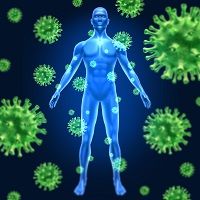Gene Mutation Discovery Predicts Susceptibility to Infections
Australian researchers found that specific cell alterations impair their infection-fighting function.

Australian researchers found that specific cell alterations impair their infection-fighting function.
The STAT3 gene helps protect against fungal and bacterial infections, however, a mutation leaves individuals more susceptible to viruses, especially Staphylococcus aureus and Candida albicans. Lead authors Elissa Deenick, PhD, and Stuart Tangye, PhD, along with their colleagues examined the outcomes caused by the mutation.
The findings indicated that patients with the STAT3 mutation also have less of natural killer T (NKT) cells and mucosal-associated invariant T (MAIT) cells. MAIT cells fight organisms that produce the metabolite by sending out cytokines such as Interleukin 17 (IL-17). Since these T cells are meant to respond to specific infectious pathogens, those with the mutation are at a higher risk for viruses.
“This is the first report to identify the STAT3 signaling pathway as non-redundant for maintenance of NKT and MAIT cells in healthy people,” Tangye, associate professor at Sydney’s Garvan Institute of Medical Research, said in a news release.
Unfortunately, these cells play major roles in the immune system so having the deficiency is deleterious.
The researchers were able to uncover more information on the STAT3 patients by researching the parents — a task that was surprising accomplished. The parents had a combination of normal and mutated MAIT and NKT cells. Only the normal cells survived.
“The chances of us finding those parents, and therefore being able to demonstrate this cell-intrinsic effect in a human study, are almost ridiculously slim,” Deenick said.
Very little is known about MAIT cells, therefore, these findings documented in Journal of Experimental Medicine are significant. They also give insight to primary immunodeficiencies.
“Our next step will be to study them in the context of other infectious diseases,” Tangye said. “In addition to being an important basic science finding, this knowledge expands the disease profile of patients with STAT 3 mutations, and will help in the development of better treatments.”